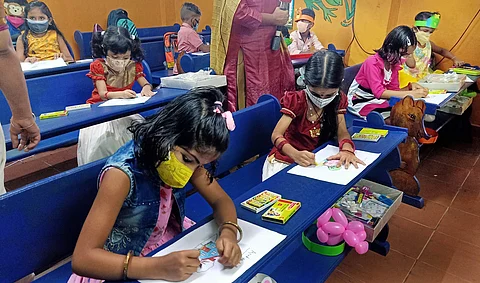

The draft National Curriculum Framework (NCF) has stressed that assessment methods in schools should be such that they do not add any burden on children. With this statement, it notes that explicit tests and exams are completely inappropriate assessment tools for children up to Class II and suggests introducing written tests from Class III onwards.
"Assessment should allow for diversity among children and in their learning. Children learn differently and express their learning differently too. There might be many ways to assess the achievement of a learning outcome or competency," the draft reads, as per a report by PTI.
"The teacher should have the ability to design different kinds of assessment for the same learning outcome and use each assessment appropriately. Assessment should enable recording and documentation. Children's progress should be described and analysed through systematic collection of evidence. Assessment should not contribute to any additional burden for the child. Assessment tools and processes should be designed such that they are a natural extension of the learning experience for the child," it adds.
All in all, the draft suggests that two important methods of assessment, which are appropriate for the foundational stage of learning, are observations of the child and analysing artifacts that the child has produced as part of their learning experience. Next, for the preparatory stage (Classes III to V), the document says, "Written tests should be introduced at this stage".
"A variety of assessment methods should be used to promote learning. Portfolios can be used to capture student progress holistically through their work. This could also provide a reliable picture of their learning to parents. Peer and self-assessments could also be introduced to help students monitor the trajectory of their own learning," it elaborates.
"At the end of the preparatory stage, there should be a comprehensive summative assessment of the student's readiness to enter the middle stage where several new curricular areas are introduced," it reads further. For the next stage (Middle stage - Classes VI to VIII), the draft recommends shifting the focus of the curriculum to conceptual understanding and higher-order capacities.
"Therefore, classroom assessment techniques such as projects, debates, presentations, experiments, investigations, role plays, journals and portfolios should be used to assess learning. Regular summative assessments at this stage will help students synthesize their learning at logical intervals such as year-end, term-end, and unit-end. Summative assessments comprising multiple-choice questions and constructed responses like short and long answer, may be used periodically," it says.
Here comes the secondary stage
In the secondary stage (Classes IX to XII), the draft asserts that comprehensive classroom assessments should be effectively practiced for facilitating meaningful learning and constructive feedback. Regular summative assessments should be conducted for recording students learning against competencies.
"Self-assessment will play a key role in student learning at this stage. Students should be facilitated to monitor what they are learning and use the feedback from this monitoring to adjust, adapt, and decide their own strategies for learning," it says, as per PTI.
"Summative assessments can be designed using case-based questions, simulations, and essay-type questions to enable assessment of competencies. At this stage, students should also be prepared to undertake the board examinations and other selection tests to gain access to higher education and livelihood opportunities," it adds.
The Ministry of Education launched the NCF for the foundational stage (NCF-FS) for children between the ages of three to eight years in October 2022. In continuation of that policy, the next NCF for school education is being prepared. Four NCFs, based on the "5+3+3+4 curricular and pedagogical" structure that the National Education Policy (NEP) 2020 recommended for school education, are being designed.
Revamping Class X and XII Board exams, aligning the shift from 10+2 structure to 5+3+3+4 structure, and emphasising developmental perspectives suggesting curricular and pedagogical shifts at different stages are among the recommendations made in the pre-draft. It was released by the Education Ministry on April 6. The ministry has invited suggestions from stakeholders such as students, parents, teachers and scholars.
